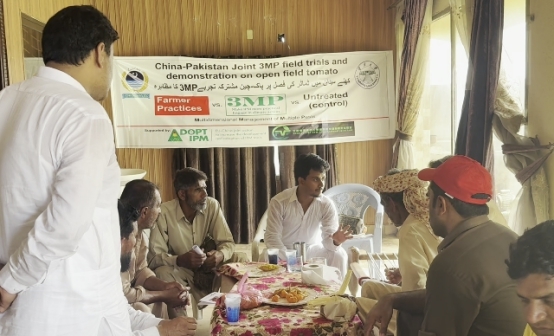by Wang Kai
SARGODHA, Sept. 22 (China Economic Net) - Pakistan’s tomato fields may soon be greener and healthier, thanks to a groundbreaking collaboration between scientists in Pakistan and China that has shown farmers can slash pesticide use by over 40% without sacrificing yields.
In field trials just wrapped up in Sargodha, researchers from the University of Agriculture, Faisalabad (UAF) and China’s Yunnan University tested a pioneering eco-friendly pest management system that promises to transform how Pakistan grows one of its most important crops.
The project, conducted under the framework of the Yunnan Fruit-Vegetable-Flower IPM International Joint Lab, targets one of Pakistani agriculture’s toughest challenges: pests like the invasive Tuta absoluta, which devastate tomato fields, particularly in Punjab’s blistering heat.
Tomatoes are cultivated year-round across around 150,000-hectare area in Pakistan, where open-field grown tomato crops yield approximately 4-6 tons per acre, which is far below the world average of more than 10 tons per acre. A 2024 study by Agriculture University Peshawar has concluded that the lack of knowledge among farmers and the absence of proper management contribute to infestations of pests, leading to decreased tomato crop yields.

China-Pakistan joint 3MP field trials and demonstration on open field tomato [Photo provided to China Economic Net]
“With no officially recommended pesticides available, many farmers resort to heavy, unregulated chemical spraying—fueling pest resistance, degrading soils, threatening biodiversity, and putting human health at risk,” Dr. Abid Ali, a Pakistani agriculturist told China Economic Net.
The research team, with Pakistani Ph.D. candidates at Yunnan University Mr. Jawad Hassan and Miss Sana Anjum involved in key field work in the tomato-growing heartland of Chak # 48 NB in Sargodha, tested an innovative approach dubbed the “3MP” strategy (Multidimensional Management of Multiple Pests).
“This method moves away from sole reliance on chemicals. Instead, it combines two core techniques: adjusting fertilization to strengthen the tomato plant’s natural resistance, and planting specific companion crops like Sesamum indicum and Verbena hybrida adjacent to the tomato crops. These companion plants act as a natural pest control system; the former lures pests away from tomatoes acting as a ‘trap crop’, while the latter provides nectar to nourish beneficial insects (arthropod natural enemies) that prey on the pests,” Dr. Han Peng from the joint lab told China Economic Net.
The results, compared against conventional farmer practices and control plots with no management, were impressive. “The 3MP strategy demonstrated an over 40% reduction in chemical pesticide use, maintained or even slightly increased tomato yields, significantly improved fruit quality and soil health, a remarkable reduction in greenhouse gas emissions associated with farming practices, and a notable boost in field biodiversity,” Dr. Han introduced.
This collaborative effort, which began in 2023 is part of a larger global validation of the 3MP strategy, which is also being tested in China, Vietnam, Thailand, and several European nations. Notably, the research and the 3MP field trials have drawn attention of European Commission which finances the collaborative activities in Europe through Horizon 2020 program “ADOPT-IPM”.
According to Dr. Ali, the next phase involves pushing for policy adoption. The research teams plan to hold workshops for farmers, extension workers, and policymakers with the goal of integrating the 3MP strategy into national pest management guidelines.
(Editor: fubo )


